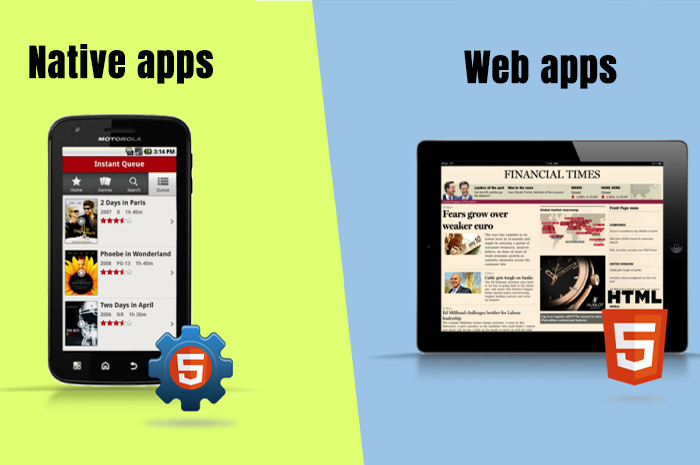By TheMadTeam on November 18th, 2020
5 min Read

Once you decide to build an app for your business, you will come across a variety of technical terms like native apps and web apps. At some point, you may be forced to make a choice between the two. If that’s where you find yourself now, this guide is for you.
The main and most obvious difference between web apps and native apps is that the former is not designed for a specific operating system and is accessed via a phone browser. Native apps, on the other hand, are developed for use on a particular platform such as Android or iOS.
There are many other differences between the two, particularly how they are developed and deployed.
An experienced mobile app development company in Sydney can help you make a more informed decision when it comes to identifying the right app for your business between these two. To start you off on this journey, we will take a detailed look at both web apps and native apps and examine their strengths and weaknesses.
Web apps work like mobile apps but from your phone’s browser. You do not need to download or install them; they simply adapt to the device you are using to access them.
One very special thing about web apps is that they store user data in the device cache. This makes it possible for the user to stay updated at all times, unlike mobile apps where you have to download updates.
A common question we get is “Why use web apps? Especially if you already have a website of your own?”
Well, a web application works better than a website, especially where more interactivity and higher and reliable loading speeds are needed.
With the help of an app development company in Sydney, you can convert your website into a progressive web app. They will adjust your website for it to meet all the requirements of a web application.
You will then be able to take advantage of cutting edge web technologies that are only available to progressive web apps, allowing you to improve the mobile user experience on your website.
That said, let’s take a look at the pros and cons of web applications. This will make it easier for you to decide if it is the perfect fit for your business.
The fact that web apps have URLs means that they are indexed by Google. Why is this important?
It means that you will be able to make use of search engine optimisation(SEO) to get your web app on the first page of the Google search engine result pages. If a huge portion of your audience comes from web traffic, then a web app will be of more value to your business.
The fact that customers do not need to download your app to use it can do wonders for your user retention rates. A lot of smartphone users delete apps from their phones for many reasons, one of the most popular being a lack of storage space.
The fact that web apps are independent makes them more accessible to a larger number of people. All a customer needs is a browser and an internet connection.
Many small businesses do not have the budget to fund the development of a native app. In such cases, a web app is a godsend solution. Web apps do not require a lot of time to create. They are also easier to develop when compared to native apps.
With a web app, you will be locked out of the app store market. And since your app is not listed in any of the app stores, users won’t be able to find you or your products or services unless you hire a mobile app developer in Australia to build a native app for your business. This can be expensive.
Web apps nowadays make use of most of the features on a device, but the user will still have to grant access to them. Sometimes they might not feel comfortable allowing a web app to access certain features of their device for security purposes. This will reduce the functionality of your app.
As we mentioned earlier, native apps are designed in a specific programming language for a particular platform. Smartphone users can download the app from either the App Store or the Google Play Store. Let’s look at some pros and cons of native apps.
So, Which App Will Benefit Your Business More?
Both web apps and native apps have special benefits and downsides. It all comes down to the unique needs that your business has.
If you are on a budget, looking to tap into search engine traffic and get quality leads or need your app developed faster, a web app is your ideal option. But if budget is the least of your concern and you are looking for more functionality and better user experiences, then native apps are a perfect option.
You can also have both Web App And Native apps developed for your business. This is best done by a company that provides both iOS and Android mobile app development services in Australia. This way, you will enjoy the special benefits offered by both apps when it comes to digital experiences.
In case you are still on the fence about whether to go with a native app or a web app for your business, consult a mobile app development company in Sydney today.

FLEXIBLE ENGAGEMENT MODELS
24X7 SUPPORT ACROSS ALL TIMEZONES
COMPETITIVE PRICING & ONTIME DELIVERY
STATE OF THE ART IT INFRASTRUCTURE
STRONG TECHNOLOGY COMPETENCY
6 MONTHS FREE TECHNICAL SUPPORT
